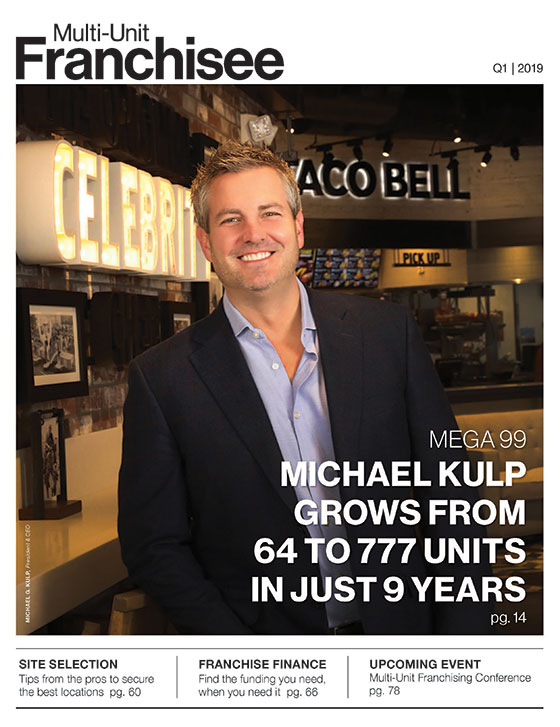Rollover Funding: Have You Considered ROBS?

If you are planning to open new units in 2019 or expand into a new brand, you might consider Rollovers as Business Startups (ROBS) funding. As the name suggests, it is often thought of as funding available only for new businesses. However, the same principles for startups can also be applied to expanding your existing operation.
This could be a possibility if you left your corporate job years ago and still have an IRA or 401(k) just sitting there, not growing at a level you would like. Instead, it could be used to fund your own growth.
Because of the tax benefits, many Americans have a significant portion of their savings in retirement plans. Without the proper structure, using these funds can result in significant taxes and penalties. Using the ROBS structure can avoid these penalties and defer the taxes. Typically, ROBS funding is best used in conjunction with an SBA loan. This is not borrowing against your 401(k), and therefore not subject to the $50,000 maximum, and you can use up to 100 percent of your funds.
Benetrends has been a multi-unit funding resource for more than 35 years and was the pioneer of the ROBS strategy. According to CEO Dallas Kerley, "It is critical to have a strategic funding plan in place to open multiple units. If you fund the first unit the wrong way, it makes opening subsequent units more difficult or impossible."
For example, if you are funding a 3-pack, pull out enough money for the cash injection on an SBA loan for the first unit and leave the remaining balance in the retirement plan. The bank cannot collateralize the funds in the retirement plan, so those funds will be available for the subsequent units.
When it comes time to fund the second unit, take just enough cash out of the retirement plan to fund the second unit, either in its entirety or in conjunction with a second SBA loan. When it comes time for the third location, you can use the remaining funds from the retirement plan.
If the first unit is cash-flow positive, try to get an expansion loan of the first SBA loan, thus requiring a smaller cash injection than the alternative of seeking a third loan.
Not for everyone
While ROBS is an attractive option for many business owners, you should verify whether or not it fits your circumstances and business needs. Here are a few signs that ROBS might not be the ideal fit for funding your business:
- You have less than $40,000 in your IRA or 401(k) account, or you need less than $40,000 to expand your business.
- Your retirement account is sponsored by a current employer, and you're not expecting to leave that employment.
- Your retirement funds are tied up in a non-tax-deferred retirement account such as a Roth IRA, a non-spousal inherited IRA, or annuities with surrender charges.
- You plan to grow your business with a partner who is not willing or able to invest financially in the business.
4 steps to ROBS
- Set up a C corporation. The process begins with establishing a new corporation using the proper legal structure to support the establishment and operation of the company's qualified retirement plan.
- Design a new qualified retirement plan. To avoid early withdrawal penalties and preserve tax-deferred status, you'll need a new retirement plan to move your funds into. You are probably not a retirement plan expert, and setting up a compliant plan takes expertise. Working with advisors who have extensive expertise in setting up retirement plans for all types of businesses can help ensure that you derive the most value for your plan.
- Transfer your retirement funds into the new plan. After your corporate retirement plan has been designed, you'll need to identify an appropriate plan custodian. This custodian creates the new corporate retirement plan account according to the design and specifications you've developed. Your plan custodian will work with you to fill out temporary IRA documents. If you're rolling over funds from an IRA, your plan custodian initiates the movement of those funds; if you're rolling over funds from a 401(k), you must initiate it.
- Use the retirement plan's funds to launch your business. Finally, rollover contributions can be invested in the stock of the new company that sponsors the retirement plan. If you or other plan participants direct an investment of your rollover contribution in company stock, the plan then purchases stock in the new company. The company stock purchased by the plan is credited to the individual accounts of plan participants based on their investment decision, and the plan can now invest in the newly formed C corporation. This means your new corporation now has the capital to start, purchase, or recapitalize a business or franchise.
ROBS financing can be complicated. However, the benefits in reduced interest payments can significantly help cash flow as you expand your business.
Rod Bristol is the director of business development and a presenter at Profit Soup, a financial education organization specializing in franchised companies. He can be reached at rod.bristol@profitsoup.com or at 206-427-5333.
Share this Feature
Recommended Reading:
Comments:
comments powered by DisqusFRANCHISE TOPICS
- Multi-Unit Franchising
- Get Started in Franchising
- Growth
- Operations
- Open New Units
- Leadership
- Marketing
- Technology
- Legal
- Awards
- Rankings
- Trends
- Featured Franchise Stories
FEATURED IN

Multi-Unit Franchisee Magazine: Issue 1, 2019
$3,000,000
$564,300




 The multi-unit franchise opportunities listed above are not related to or endorsed by Multi-Unit Franchisee or Franchise Update Media Group. We are not engaged in, supporting, or endorsing any specific franchise, business opportunity, company or individual. No statement in this site is to be construed as a recommendation. We encourage prospective franchise buyers to perform extensive due diligence when considering a franchise opportunity.
The multi-unit franchise opportunities listed above are not related to or endorsed by Multi-Unit Franchisee or Franchise Update Media Group. We are not engaged in, supporting, or endorsing any specific franchise, business opportunity, company or individual. No statement in this site is to be construed as a recommendation. We encourage prospective franchise buyers to perform extensive due diligence when considering a franchise opportunity.